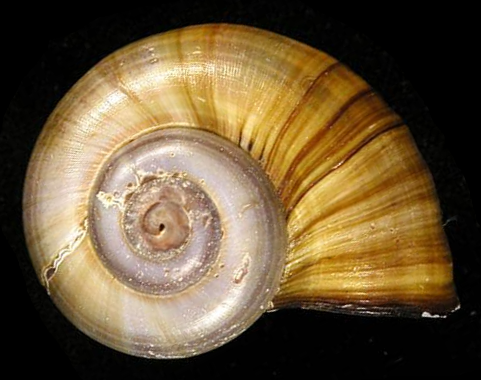Pomacea Lineata on:
[Wikipedia]
[Google]
[Amazon]
''Pomacea lineata'' is a

''Pomacea'' (''Pomacea'') ''lineata''
The apple snail website. lineata Gastropods described in 1827 {{Ampullariidae-stub
species
In biology, a species is the basic unit of classification and a taxonomic rank of an organism, as well as a unit of biodiversity. A species is often defined as the largest group of organisms in which any two individuals of the appropriate s ...
of a freshwater snail
Freshwater snails are gastropod mollusks which live in fresh water. There are many different families. They are found throughout the world in various habitats, ranging from ephemeral pools to the largest lakes, and from small seeps and springs ...
with gill
A gill () is a respiratory organ that many aquatic organisms use to extract dissolved oxygen from water and to excrete carbon dioxide. The gills of some species, such as hermit crabs, have adapted to allow respiration on land provided they are ...
s and an operculum, an aquatic gastropod
The gastropods (), commonly known as snails and slugs, belong to a large taxonomic class of invertebrates within the phylum Mollusca called Gastropoda ().
This class comprises snails and slugs from saltwater, from freshwater, and from land. T ...
mollusk
Mollusca is the second-largest phylum of invertebrate animals after the Arthropoda, the members of which are known as molluscs or mollusks (). Around 85,000 extant species of molluscs are recognized. The number of fossil species is e ...
in the family Ampullariidae, the apple snails.
Distribution
This species occurs inBrazil
Brazil ( pt, Brasil; ), officially the Federative Republic of Brazil (Portuguese: ), is the largest country in both South America and Latin America. At and with over 217 million people, Brazil is the world's fifth-largest country by area ...
.

Ecology
Theapple snail
Ampullariidae, commonly known as the apple snails, is a family of large freshwater snails, aquatic gastropod mollusks with a gill and an operculum. These snails simultaneously have a gill and a lung as functional respiratory structures, which ...
is a keystone species
A keystone species is a species which has a disproportionately large effect on its natural environment relative to its abundance, a concept introduced in 1969 by the zoologist Robert T. Paine. Keystone species play a critical role in maintaini ...
in Pantanal's ecosystem. When the wetlands are flooded once a year, the grass and other plants will eventually die and start to decay. During this process, decomposing microbes deplete the shallow water of all oxygen, suffocating larger decomposers. Unlike other decomposing animals, the apple snail have both gills and lungs, making it possible for them to thrive in anoxic waters where they recycle the nutrients. To get oxygen they extend a long snorkel to the water surface, and pumps air into their lungs. This ability allows them to consume all the dead plant matter and turning it into nutritious fertilizer available for the plants in the area. The snails themselves are also food for a variety of animals.
Human use
''Pomacea lineata'' is used as a zootherapeutical product for the treatment ofasthma
Asthma is a long-term inflammatory disease of the airways of the lungs. It is characterized by variable and recurring symptoms, reversible airflow obstruction, and easily triggered bronchospasms. Symptoms include episodes of wheezing, cou ...
, sprains, boils
A boil, also called a furuncle, is a deep folliculitis, which is an infection of the hair follicle. It is most commonly caused by infection by the bacterium ''Staphylococcus aureus'', resulting in a painful swollen area on the skin caused by an ...
and ulcer in traditional Brazilian medicine
Traditional Brazilian medicine (Portuguese: Medicina indígena) includes many native South American elements, and imported African ones. It is predominantly used in areas where indigenous groups and African descendants reside, like in the northea ...
in the Northeast of Brazil
The Northeast Region of Brazil ( pt, Região Nordeste do Brasil; ) is one of the five official and political regions of the country according to the Brazilian Institute of Geography and Statistics. Of Brazil's twenty-six states, it comprises n ...
.
References
External links
''Pomacea'' (''Pomacea'') ''lineata''
The apple snail website. lineata Gastropods described in 1827 {{Ampullariidae-stub